Business Law Report: Siemens Bribery and Corruption Case Study
VerifiedAdded on 2022/10/19
|7
|1508
|12
Report
AI Summary
This report provides a comprehensive analysis of the Siemens bribery and corruption case, examining the company's involvement in bribing government officials across multiple countries to secure infrastructure contracts. It begins with an introduction and a brief profile of Siemens, a major industrial and electronics company. The report summarizes the case, detailing accusations and findings from the U.S. authorities under the Foreign Corrupt Practices Act. Key issues, such as the bribery culture endorsed by senior managers and the resulting damage to the company's reputation, are identified. Secondary issues, like the disruption of legitimate business practices and violations of ethical conduct, are also discussed. The case is explored through the lens of international business theories, highlighting the tendency of large companies to engage in corrupt practices for market gain. Themes of ethics, morality, and the justifiability of penalties are explored. The report answers questions related to ethical behavior, the lack of regulations, and the adoption of remedial measures. The conclusion emphasizes the need for effective regulations to prevent corrupt practices and the importance of relativism in dealing with such cases. References to relevant articles and websites are provided.
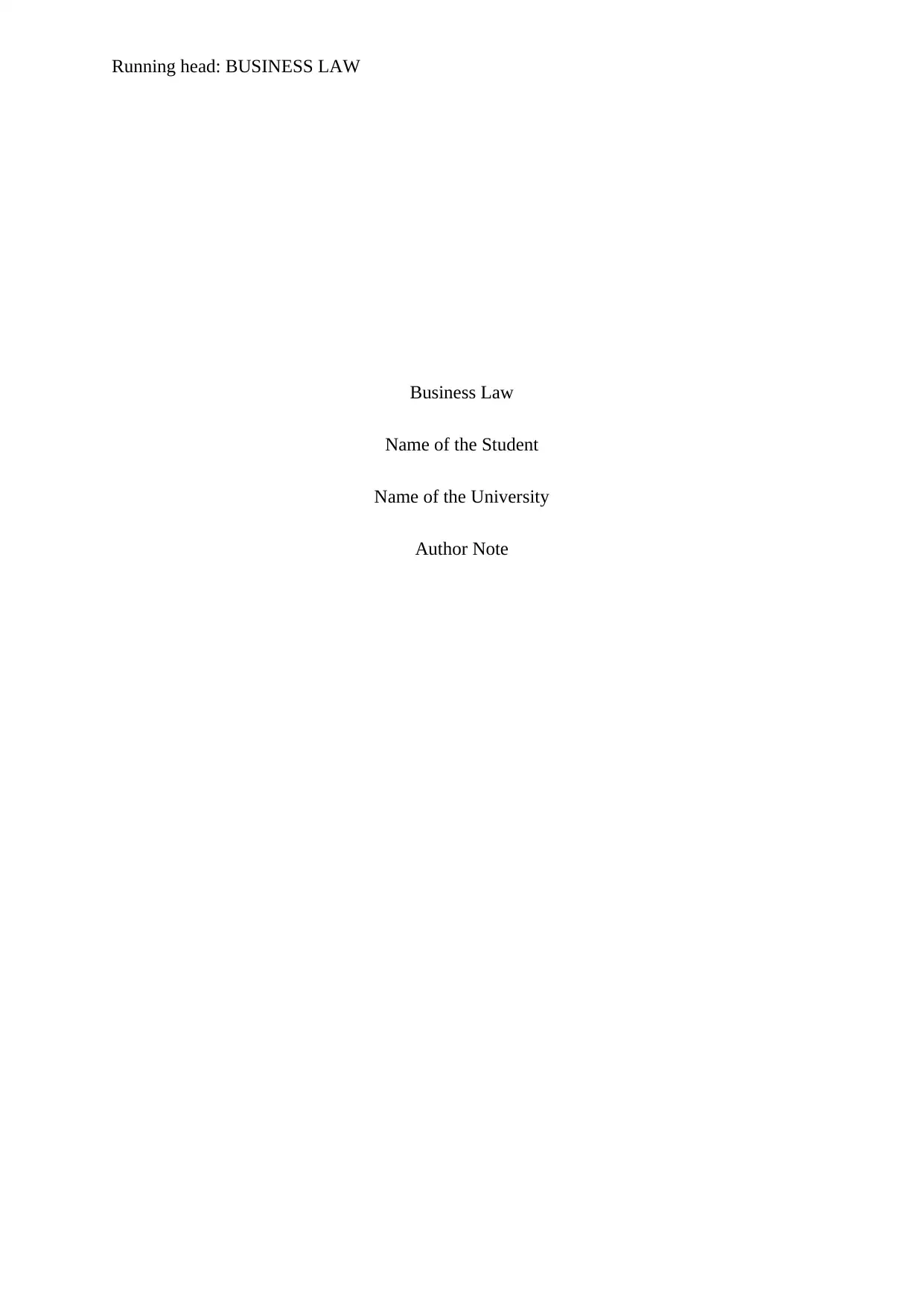
Running head: BUSINESS LAW
Business Law
Name of the Student
Name of the University
Author Note
Business Law
Name of the Student
Name of the University
Author Note
Paraphrase This Document
Need a fresh take? Get an instant paraphrase of this document with our AI Paraphraser
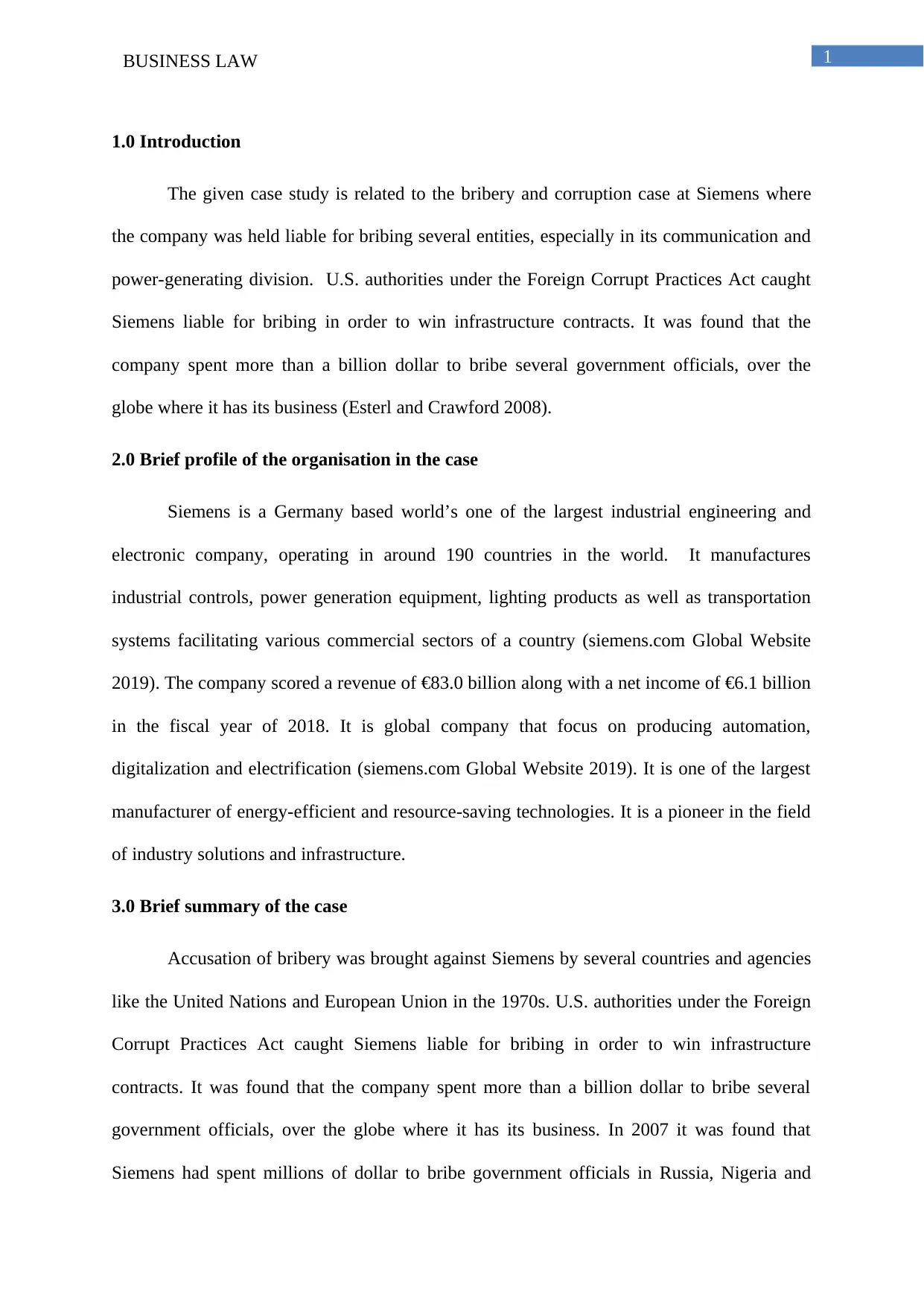
1BUSINESS LAW
1.0 Introduction
The given case study is related to the bribery and corruption case at Siemens where
the company was held liable for bribing several entities, especially in its communication and
power-generating division. U.S. authorities under the Foreign Corrupt Practices Act caught
Siemens liable for bribing in order to win infrastructure contracts. It was found that the
company spent more than a billion dollar to bribe several government officials, over the
globe where it has its business (Esterl and Crawford 2008).
2.0 Brief profile of the organisation in the case
Siemens is a Germany based world’s one of the largest industrial engineering and
electronic company, operating in around 190 countries in the world. It manufactures
industrial controls, power generation equipment, lighting products as well as transportation
systems facilitating various commercial sectors of a country (siemens.com Global Website
2019). The company scored a revenue of €83.0 billion along with a net income of €6.1 billion
in the fiscal year of 2018. It is global company that focus on producing automation,
digitalization and electrification (siemens.com Global Website 2019). It is one of the largest
manufacturer of energy-efficient and resource-saving technologies. It is a pioneer in the field
of industry solutions and infrastructure.
3.0 Brief summary of the case
Accusation of bribery was brought against Siemens by several countries and agencies
like the United Nations and European Union in the 1970s. U.S. authorities under the Foreign
Corrupt Practices Act caught Siemens liable for bribing in order to win infrastructure
contracts. It was found that the company spent more than a billion dollar to bribe several
government officials, over the globe where it has its business. In 2007 it was found that
Siemens had spent millions of dollar to bribe government officials in Russia, Nigeria and
1.0 Introduction
The given case study is related to the bribery and corruption case at Siemens where
the company was held liable for bribing several entities, especially in its communication and
power-generating division. U.S. authorities under the Foreign Corrupt Practices Act caught
Siemens liable for bribing in order to win infrastructure contracts. It was found that the
company spent more than a billion dollar to bribe several government officials, over the
globe where it has its business (Esterl and Crawford 2008).
2.0 Brief profile of the organisation in the case
Siemens is a Germany based world’s one of the largest industrial engineering and
electronic company, operating in around 190 countries in the world. It manufactures
industrial controls, power generation equipment, lighting products as well as transportation
systems facilitating various commercial sectors of a country (siemens.com Global Website
2019). The company scored a revenue of €83.0 billion along with a net income of €6.1 billion
in the fiscal year of 2018. It is global company that focus on producing automation,
digitalization and electrification (siemens.com Global Website 2019). It is one of the largest
manufacturer of energy-efficient and resource-saving technologies. It is a pioneer in the field
of industry solutions and infrastructure.
3.0 Brief summary of the case
Accusation of bribery was brought against Siemens by several countries and agencies
like the United Nations and European Union in the 1970s. U.S. authorities under the Foreign
Corrupt Practices Act caught Siemens liable for bribing in order to win infrastructure
contracts. It was found that the company spent more than a billion dollar to bribe several
government officials, over the globe where it has its business. In 2007 it was found that
Siemens had spent millions of dollar to bribe government officials in Russia, Nigeria and
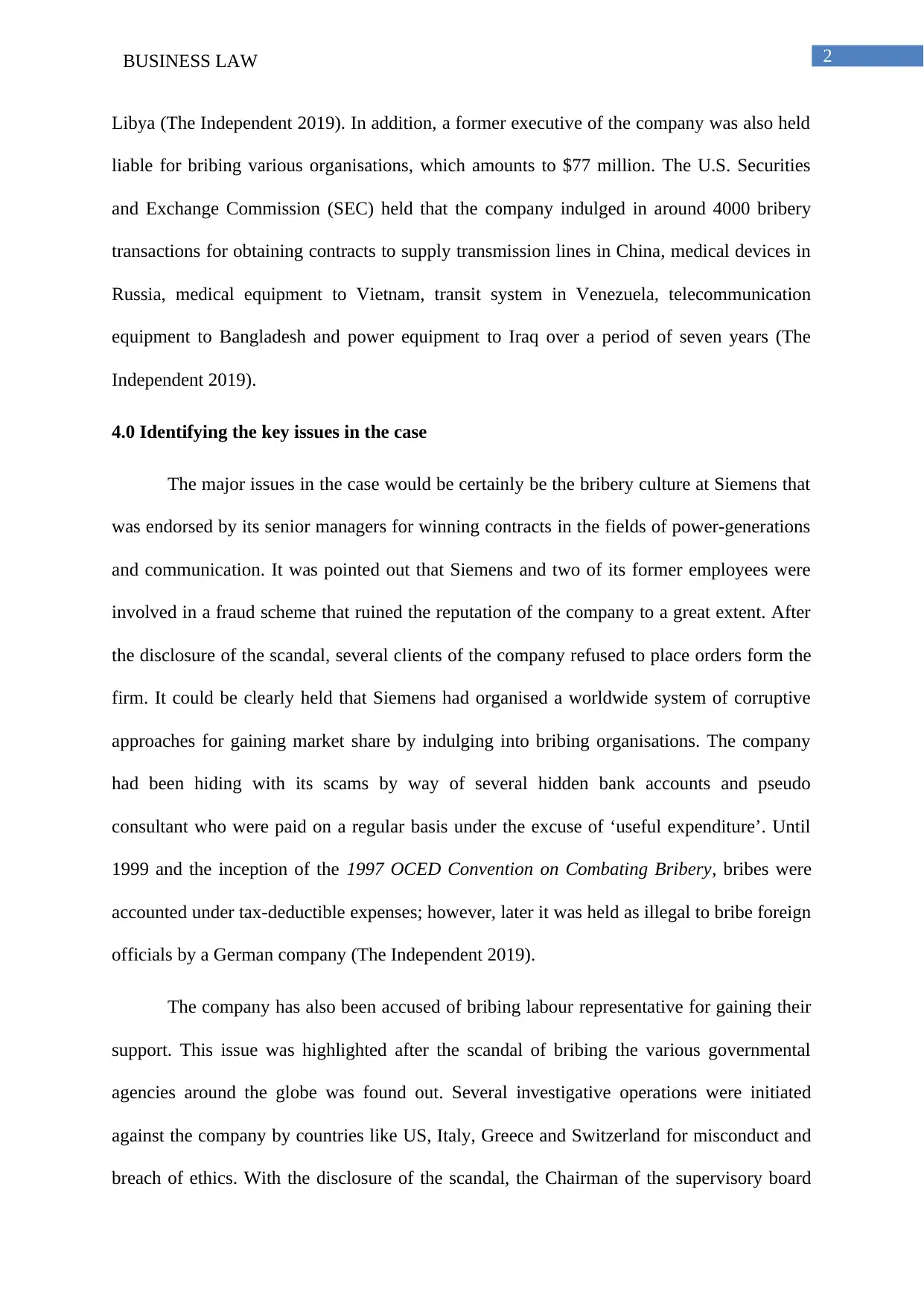
2BUSINESS LAW
Libya (The Independent 2019). In addition, a former executive of the company was also held
liable for bribing various organisations, which amounts to $77 million. The U.S. Securities
and Exchange Commission (SEC) held that the company indulged in around 4000 bribery
transactions for obtaining contracts to supply transmission lines in China, medical devices in
Russia, medical equipment to Vietnam, transit system in Venezuela, telecommunication
equipment to Bangladesh and power equipment to Iraq over a period of seven years (The
Independent 2019).
4.0 Identifying the key issues in the case
The major issues in the case would be certainly be the bribery culture at Siemens that
was endorsed by its senior managers for winning contracts in the fields of power-generations
and communication. It was pointed out that Siemens and two of its former employees were
involved in a fraud scheme that ruined the reputation of the company to a great extent. After
the disclosure of the scandal, several clients of the company refused to place orders form the
firm. It could be clearly held that Siemens had organised a worldwide system of corruptive
approaches for gaining market share by indulging into bribing organisations. The company
had been hiding with its scams by way of several hidden bank accounts and pseudo
consultant who were paid on a regular basis under the excuse of ‘useful expenditure’. Until
1999 and the inception of the 1997 OCED Convention on Combating Bribery, bribes were
accounted under tax-deductible expenses; however, later it was held as illegal to bribe foreign
officials by a German company (The Independent 2019).
The company has also been accused of bribing labour representative for gaining their
support. This issue was highlighted after the scandal of bribing the various governmental
agencies around the globe was found out. Several investigative operations were initiated
against the company by countries like US, Italy, Greece and Switzerland for misconduct and
breach of ethics. With the disclosure of the scandal, the Chairman of the supervisory board
Libya (The Independent 2019). In addition, a former executive of the company was also held
liable for bribing various organisations, which amounts to $77 million. The U.S. Securities
and Exchange Commission (SEC) held that the company indulged in around 4000 bribery
transactions for obtaining contracts to supply transmission lines in China, medical devices in
Russia, medical equipment to Vietnam, transit system in Venezuela, telecommunication
equipment to Bangladesh and power equipment to Iraq over a period of seven years (The
Independent 2019).
4.0 Identifying the key issues in the case
The major issues in the case would be certainly be the bribery culture at Siemens that
was endorsed by its senior managers for winning contracts in the fields of power-generations
and communication. It was pointed out that Siemens and two of its former employees were
involved in a fraud scheme that ruined the reputation of the company to a great extent. After
the disclosure of the scandal, several clients of the company refused to place orders form the
firm. It could be clearly held that Siemens had organised a worldwide system of corruptive
approaches for gaining market share by indulging into bribing organisations. The company
had been hiding with its scams by way of several hidden bank accounts and pseudo
consultant who were paid on a regular basis under the excuse of ‘useful expenditure’. Until
1999 and the inception of the 1997 OCED Convention on Combating Bribery, bribes were
accounted under tax-deductible expenses; however, later it was held as illegal to bribe foreign
officials by a German company (The Independent 2019).
The company has also been accused of bribing labour representative for gaining their
support. This issue was highlighted after the scandal of bribing the various governmental
agencies around the globe was found out. Several investigative operations were initiated
against the company by countries like US, Italy, Greece and Switzerland for misconduct and
breach of ethics. With the disclosure of the scandal, the Chairman of the supervisory board
⊘ This is a preview!⊘
Do you want full access?
Subscribe today to unlock all pages.

Trusted by 1+ million students worldwide
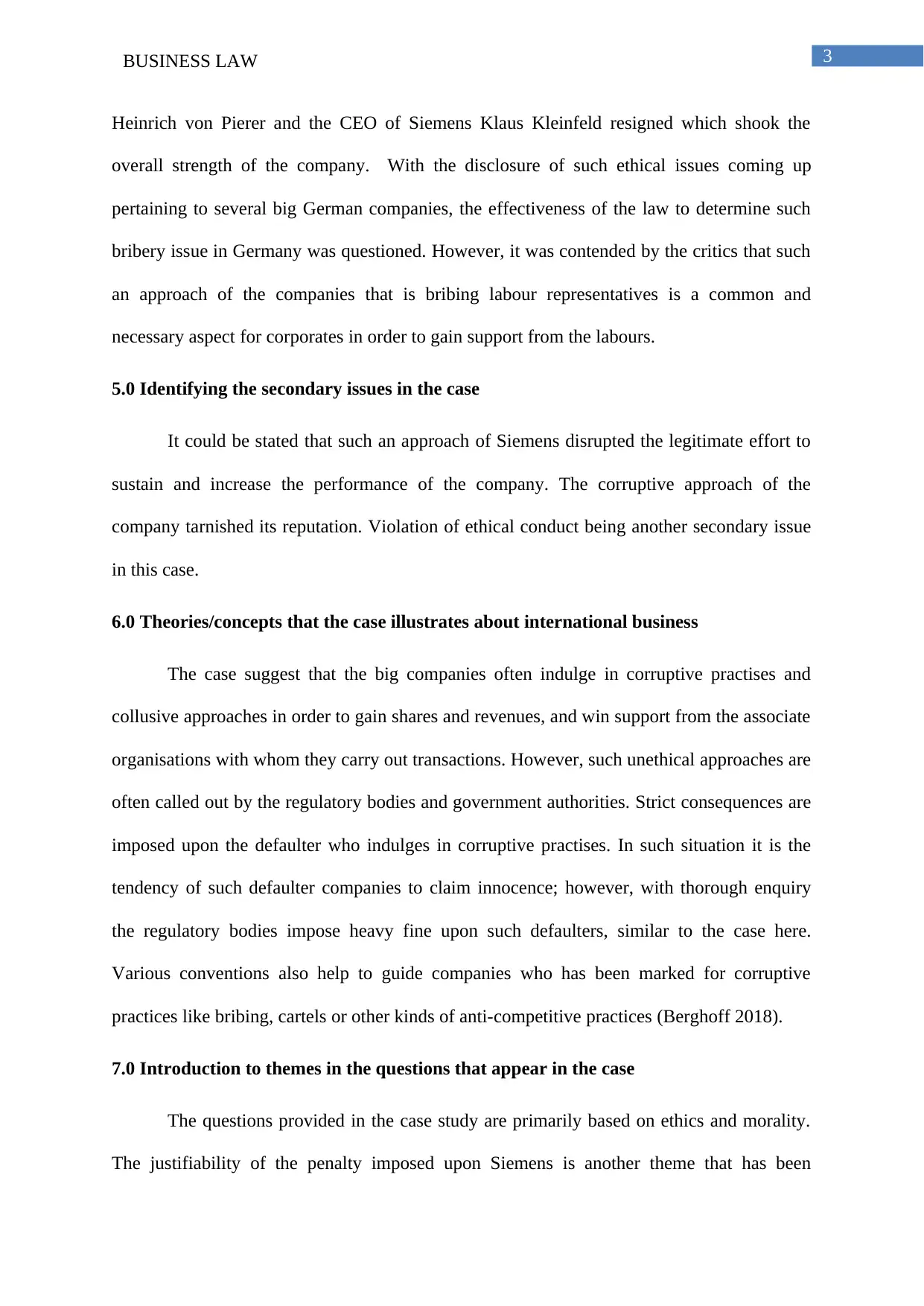
3BUSINESS LAW
Heinrich von Pierer and the CEO of Siemens Klaus Kleinfeld resigned which shook the
overall strength of the company. With the disclosure of such ethical issues coming up
pertaining to several big German companies, the effectiveness of the law to determine such
bribery issue in Germany was questioned. However, it was contended by the critics that such
an approach of the companies that is bribing labour representatives is a common and
necessary aspect for corporates in order to gain support from the labours.
5.0 Identifying the secondary issues in the case
It could be stated that such an approach of Siemens disrupted the legitimate effort to
sustain and increase the performance of the company. The corruptive approach of the
company tarnished its reputation. Violation of ethical conduct being another secondary issue
in this case.
6.0 Theories/concepts that the case illustrates about international business
The case suggest that the big companies often indulge in corruptive practises and
collusive approaches in order to gain shares and revenues, and win support from the associate
organisations with whom they carry out transactions. However, such unethical approaches are
often called out by the regulatory bodies and government authorities. Strict consequences are
imposed upon the defaulter who indulges in corruptive practises. In such situation it is the
tendency of such defaulter companies to claim innocence; however, with thorough enquiry
the regulatory bodies impose heavy fine upon such defaulters, similar to the case here.
Various conventions also help to guide companies who has been marked for corruptive
practices like bribing, cartels or other kinds of anti-competitive practices (Berghoff 2018).
7.0 Introduction to themes in the questions that appear in the case
The questions provided in the case study are primarily based on ethics and morality.
The justifiability of the penalty imposed upon Siemens is another theme that has been
Heinrich von Pierer and the CEO of Siemens Klaus Kleinfeld resigned which shook the
overall strength of the company. With the disclosure of such ethical issues coming up
pertaining to several big German companies, the effectiveness of the law to determine such
bribery issue in Germany was questioned. However, it was contended by the critics that such
an approach of the companies that is bribing labour representatives is a common and
necessary aspect for corporates in order to gain support from the labours.
5.0 Identifying the secondary issues in the case
It could be stated that such an approach of Siemens disrupted the legitimate effort to
sustain and increase the performance of the company. The corruptive approach of the
company tarnished its reputation. Violation of ethical conduct being another secondary issue
in this case.
6.0 Theories/concepts that the case illustrates about international business
The case suggest that the big companies often indulge in corruptive practises and
collusive approaches in order to gain shares and revenues, and win support from the associate
organisations with whom they carry out transactions. However, such unethical approaches are
often called out by the regulatory bodies and government authorities. Strict consequences are
imposed upon the defaulter who indulges in corruptive practises. In such situation it is the
tendency of such defaulter companies to claim innocence; however, with thorough enquiry
the regulatory bodies impose heavy fine upon such defaulters, similar to the case here.
Various conventions also help to guide companies who has been marked for corruptive
practices like bribing, cartels or other kinds of anti-competitive practices (Berghoff 2018).
7.0 Introduction to themes in the questions that appear in the case
The questions provided in the case study are primarily based on ethics and morality.
The justifiability of the penalty imposed upon Siemens is another theme that has been
Paraphrase This Document
Need a fresh take? Get an instant paraphrase of this document with our AI Paraphraser
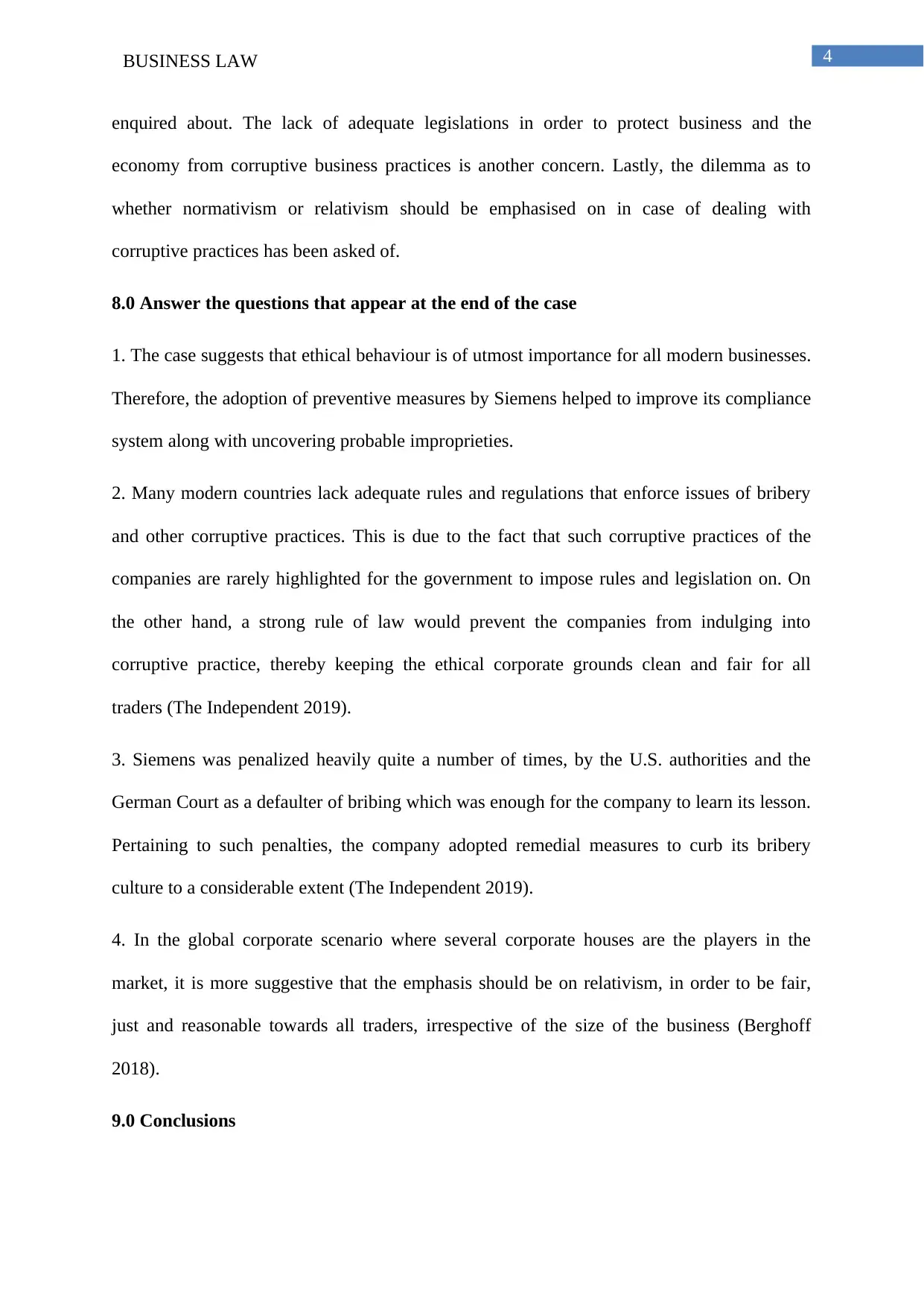
4BUSINESS LAW
enquired about. The lack of adequate legislations in order to protect business and the
economy from corruptive business practices is another concern. Lastly, the dilemma as to
whether normativism or relativism should be emphasised on in case of dealing with
corruptive practices has been asked of.
8.0 Answer the questions that appear at the end of the case
1. The case suggests that ethical behaviour is of utmost importance for all modern businesses.
Therefore, the adoption of preventive measures by Siemens helped to improve its compliance
system along with uncovering probable improprieties.
2. Many modern countries lack adequate rules and regulations that enforce issues of bribery
and other corruptive practices. This is due to the fact that such corruptive practices of the
companies are rarely highlighted for the government to impose rules and legislation on. On
the other hand, a strong rule of law would prevent the companies from indulging into
corruptive practice, thereby keeping the ethical corporate grounds clean and fair for all
traders (The Independent 2019).
3. Siemens was penalized heavily quite a number of times, by the U.S. authorities and the
German Court as a defaulter of bribing which was enough for the company to learn its lesson.
Pertaining to such penalties, the company adopted remedial measures to curb its bribery
culture to a considerable extent (The Independent 2019).
4. In the global corporate scenario where several corporate houses are the players in the
market, it is more suggestive that the emphasis should be on relativism, in order to be fair,
just and reasonable towards all traders, irrespective of the size of the business (Berghoff
2018).
9.0 Conclusions
enquired about. The lack of adequate legislations in order to protect business and the
economy from corruptive business practices is another concern. Lastly, the dilemma as to
whether normativism or relativism should be emphasised on in case of dealing with
corruptive practices has been asked of.
8.0 Answer the questions that appear at the end of the case
1. The case suggests that ethical behaviour is of utmost importance for all modern businesses.
Therefore, the adoption of preventive measures by Siemens helped to improve its compliance
system along with uncovering probable improprieties.
2. Many modern countries lack adequate rules and regulations that enforce issues of bribery
and other corruptive practices. This is due to the fact that such corruptive practices of the
companies are rarely highlighted for the government to impose rules and legislation on. On
the other hand, a strong rule of law would prevent the companies from indulging into
corruptive practice, thereby keeping the ethical corporate grounds clean and fair for all
traders (The Independent 2019).
3. Siemens was penalized heavily quite a number of times, by the U.S. authorities and the
German Court as a defaulter of bribing which was enough for the company to learn its lesson.
Pertaining to such penalties, the company adopted remedial measures to curb its bribery
culture to a considerable extent (The Independent 2019).
4. In the global corporate scenario where several corporate houses are the players in the
market, it is more suggestive that the emphasis should be on relativism, in order to be fair,
just and reasonable towards all traders, irrespective of the size of the business (Berghoff
2018).
9.0 Conclusions
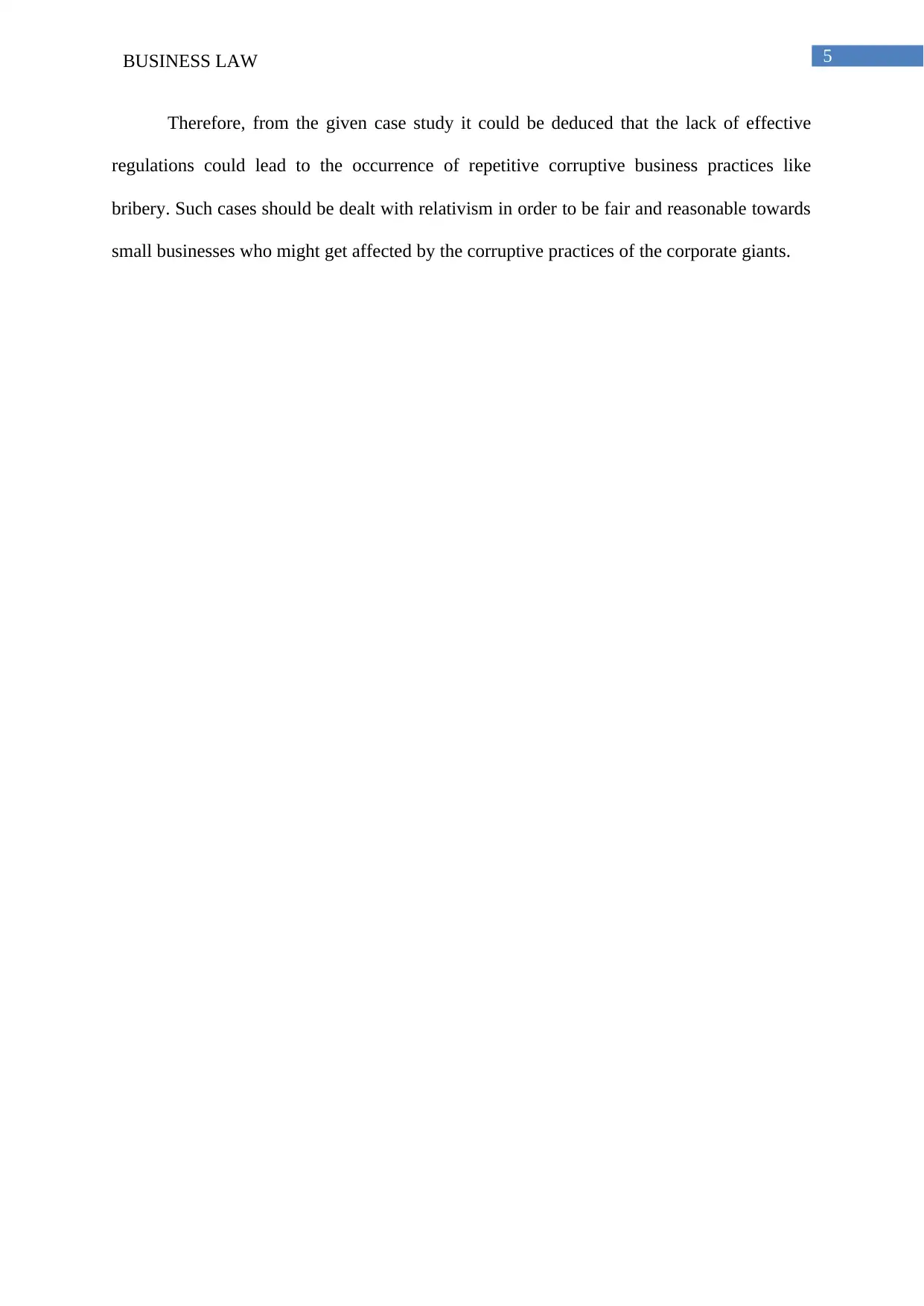
5BUSINESS LAW
Therefore, from the given case study it could be deduced that the lack of effective
regulations could lead to the occurrence of repetitive corruptive business practices like
bribery. Such cases should be dealt with relativism in order to be fair and reasonable towards
small businesses who might get affected by the corruptive practices of the corporate giants.
Therefore, from the given case study it could be deduced that the lack of effective
regulations could lead to the occurrence of repetitive corruptive business practices like
bribery. Such cases should be dealt with relativism in order to be fair and reasonable towards
small businesses who might get affected by the corruptive practices of the corporate giants.
⊘ This is a preview!⊘
Do you want full access?
Subscribe today to unlock all pages.

Trusted by 1+ million students worldwide
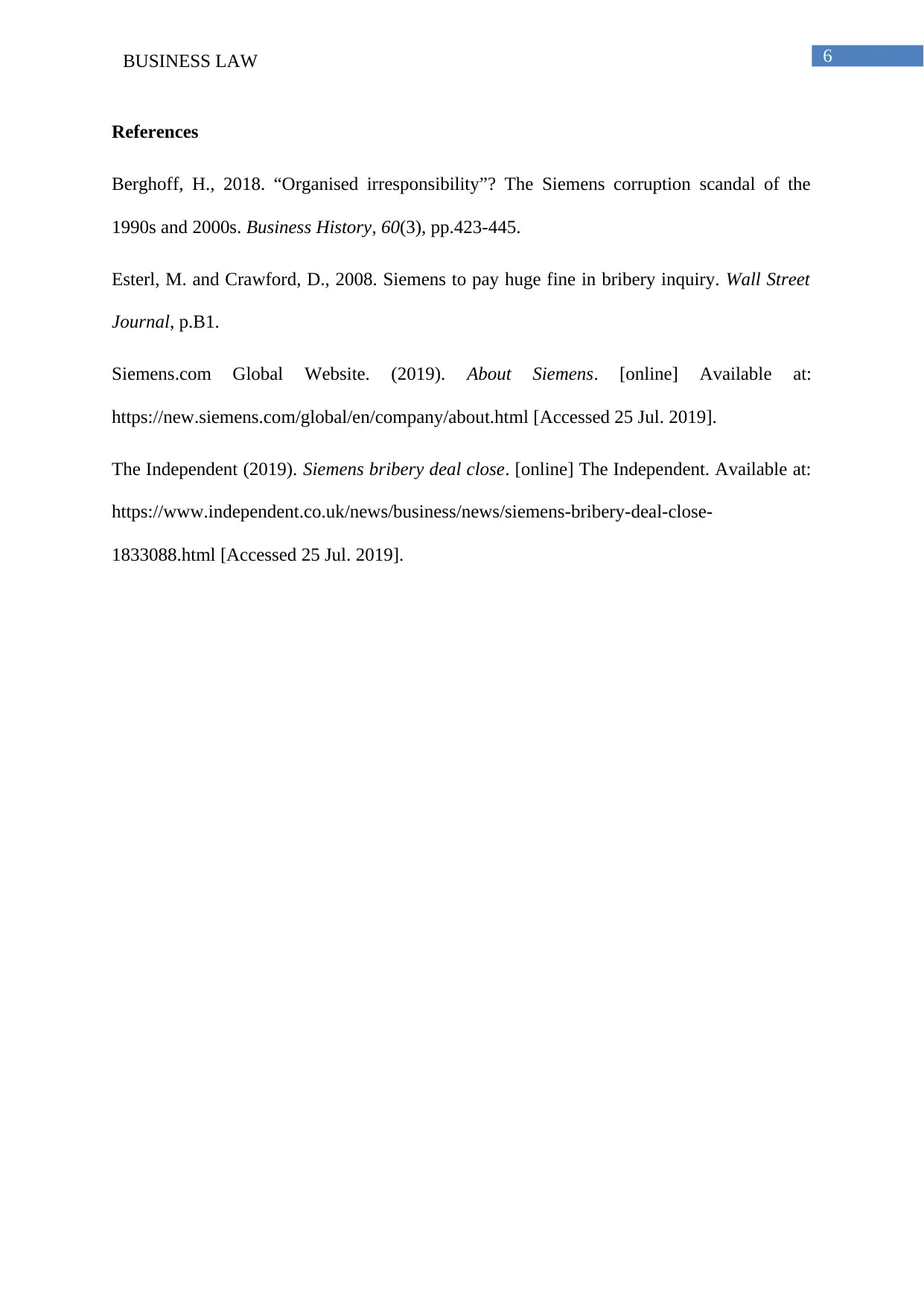
6BUSINESS LAW
References
Berghoff, H., 2018. “Organised irresponsibility”? The Siemens corruption scandal of the
1990s and 2000s. Business History, 60(3), pp.423-445.
Esterl, M. and Crawford, D., 2008. Siemens to pay huge fine in bribery inquiry. Wall Street
Journal, p.B1.
Siemens.com Global Website. (2019). About Siemens. [online] Available at:
https://new.siemens.com/global/en/company/about.html [Accessed 25 Jul. 2019].
The Independent (2019). Siemens bribery deal close. [online] The Independent. Available at:
https://www.independent.co.uk/news/business/news/siemens-bribery-deal-close-
1833088.html [Accessed 25 Jul. 2019].
References
Berghoff, H., 2018. “Organised irresponsibility”? The Siemens corruption scandal of the
1990s and 2000s. Business History, 60(3), pp.423-445.
Esterl, M. and Crawford, D., 2008. Siemens to pay huge fine in bribery inquiry. Wall Street
Journal, p.B1.
Siemens.com Global Website. (2019). About Siemens. [online] Available at:
https://new.siemens.com/global/en/company/about.html [Accessed 25 Jul. 2019].
The Independent (2019). Siemens bribery deal close. [online] The Independent. Available at:
https://www.independent.co.uk/news/business/news/siemens-bribery-deal-close-
1833088.html [Accessed 25 Jul. 2019].
1 out of 7
Your All-in-One AI-Powered Toolkit for Academic Success.
+13062052269
info@desklib.com
Available 24*7 on WhatsApp / Email
![[object Object]](/_next/static/media/star-bottom.7253800d.svg)
Unlock your academic potential
Copyright © 2020–2026 A2Z Services. All Rights Reserved. Developed and managed by ZUCOL.

